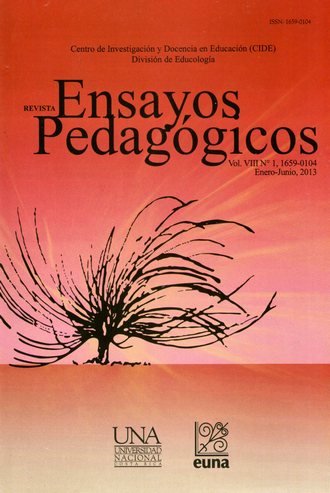Impact of High School Scientific Training in Two Cabécar and Ngäbe Indigenous Communities
DOI:
https://doi.org/10.15359/rep.8-1.6Keywords:
indigenous people, Cabécar and Ngäbe, impact, values, tradition, language, biologyAbstract
This paper presents the results of a research about the impact of the language level, values, and traditions of secondary education in tenth grade Biology at two high schools located in Cabécar and Ngäbe indigenous territories. This research was based on a mixed approach, taking into account the different kinds of instruments used. Two groups of eleventh grade (students) and two biology teachers from two different high schools were surveyed in order to gather the information. The interviews' results are shown through a descriptive analysis. The main conclusions were the following: Although the educational system applied in these communities promotes the development of their autonomous values and traditions, only few of them are still present. Moreover, this research found out that biology professionals (teachers) promote the Indigenous identity by contextualizing the mediation process. Additionally, this research evinced the importance of speaking the indegenous students’ native language in the classrooms and the importance of the lessons being taught by Cabécar or Ngäbe people.
References
Asamblea Legislativa de la República de Costa Rica. (s.f.). Ley de aprobación del Convenio N° 169 sobre Pueblos Indígenas y Tribales en Países Independientes.Recuperado de http://ministeriopublico.poder-judicial.go.cr/coop-intern/inst-inter/18/01.pdf
Barrantes, R. (2010). Investigación: un camino al conocimiento un enfoque cualitativo y cuantitativo. Costa Rica, San José: EUNED.
Bello, A. (2006).Pueblos indígenas, globalización y territorio. Recuperado de http://www.observatorio.cl/sites/default/files/biblioteca/doc_trabajo_numero4-pueblos-indigenas-glob-y-terri.pdf
Brenes, C. (2007). Tecnologías de información y comunicación: El caso de las comunidades indígenas Cabécares de Chirripó de Costa Rica. Revista Educare,1(17), 177-192.
Calzoni, L. (2006). El concepto de “Tradición” en la formación docente la tradición “Normalizadora-Disciplinadora”. Recuperado de http://www.cerpcentro.org/IMG/pdf/Concepto_de_tradicion_-_Davini.pdf
Cebrián, M. y Noguera, J. (2010). Conocimiento indígena sobre el medio ambiente y diseño de materiales educativos. Comunicar: Revista Científica Iberoamericana de Comunicación y Educación. 34(17), 115-124. Recuperado de http://dialnet.unirioja.es/servlet/articulo?codigo=3166269
García, M. (2006). La tecnología en las comunidades indígenas. Recuperado de http://www.oei.es/memoriasctsi/mesa9/m09p04.pdf
Giménez, G. (2005). La cultura como identidad y la identidad como cultura. III Encuentro internacional de Promotores y Gestos Culturales, Guadalajara, México.
Hernández, R., Fernández, C. y Baptista, P. (2006). Metodología de la investigación (4ª Ed.). México, México DF: McGrawHill.
Instituto Nacional de Estadística y Censo. (abril, 2013). X Censo Nacional de Población y VI de Vivienda 2011.Territorios Indígenas Principales indicadores demográficos y socioeconómicos. Recuperado de ttp://accionsocial.ucr.ac.cr/c/document_library/get_file?uuid=f0c2fc79-443f-4cb9-ba62-423891c547f2&groupId=23760
Ipiña. E. (1997). Condiciones y perfil del docente de educación intercultural bilingüe. Revista Iberoamericana de Educación, 13, 99-109. Recuperado de http://www.aulaintercultural.org/IMG/pdf/rie13a04.pdf
López, L. (s.f.). La cuestión de la interculturalidad y la educación latinoamericana. Recuperado de http://www.schwartzman.org.br/simon/delphi/pdf/lopes.pdf
Paz, M., (2003). Investigación cualitativa en educación. Madrid, España: McGraw-Hill/Interamericana de España, S. A. U.
Peña, E. (1997). Condiciones y perfil del docente de educación intercultural bilingüe. Revista Iberoamericana de Educación, 13, 99-102.
Rebolledo, N. (s.f.). La formación de profesores indígenas bilingües en México. Recuperado de http://bibliotecadigital.conevyt.org.mx/servicios/hemeroteca/075/075004.pdf
Romero, G. (2007). La globalización: Una plataforma de exclusión de los pueblos indígenas. La paz-Bolivia: Fondo Indígena.
Segura, M. (2006). Los valores en el planeamiento didáctico eje transversal del currículo costarricense. San José, Costa Rica: MEP. Recuperado de http://www.educadem.oas.org/documentos/boletin3/valoresyplaneamiento%20costa%20rica.pdf
Treviño, E. (2006). Evaluación del aprendizaje de los estudiantes indígenas en América Latina. Revista Mexicana de Investigación Educativa, 28(11), 225-268.
Villaro, L. (s.f.). Identidad de los pueblos. Recuperado de http://interculturalidadffyl.files.wordpress.com/2011/09/villoro_identidad.pdf
Downloads
Published
How to Cite
Issue
Section
License
Ensayos Pedagógicos is subscribed to the Attribution-NonCommertial-NoDerivatives 4.0 International Creative Commons Licence, which allows both authors and readers to freely download, store, copy, and distribute the final approved publisehd version of the manuscript (post-print) as long as this is done without commercial purposes, no derivative works are generated, and the source and author are mentioned. As well, Ensayos Pedagógicos declares that authors will remain the rightful owners of the copyrights of their work in perpetuity.







